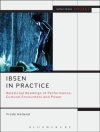Bringing theory and practice together, African Cinema and Human Rights argues that moving images have a significant role to play in advancing the causes of justice and fairness. The contributors to this volume identify three key ways in which film can achieve these goals: documenting human rights abuses and thereby supporting the claims of victims and goals of truth and reconciliation within larger communities; legitimating, and consequently solidifying, an expanded scope for human rights; and promoting the realization of social and economic rights. Including the voices of African scholars, scholar-filmmakers, African directors Jean-Marie Teno and Gaston Kaboré, and researchers whose work focuses on transnational cinema, this volume explores overall perspectives, and differences of perspective, pertaining to Africa, human rights, and human rights filmmaking alongside specific case studies of individual films and areas of human rights violations. With its interdisciplinary scope, attention to practitioners’ self-understandings, broad perspectives, and particular case studies, African Cinema and Human Rights is a foundational text that offers questions, reflections, and evidence that help us to consider film’s ideal role within the context of our ever-continuing struggle towards a more just global society.
สารบัญ
Acknowledgments
Introduction: Filmmaking on the African Continent: On the Centrality of Human Rights Thinking / Mette Hjort and Eva Jørholt
Part I: Perspectives
1. Human Rights, Africa, and Film: A Cautionary Tale / Mark Gibney
2. African Cinema: Perspective Correction / Rod Stoneman
3. Africa’s Gift to the World: An Interview with Gaston Kaboré / Rod Stoneman
4. Toward New African Languages of Protest: African Documentary Films and Human Rights / Alessandro Jedlowski
5. Challenging Perspectives: An Interview with Jean-Marie Teno / Melissa Thackway
6. In Defense of Human Rights Filmmaking: A Response to the Skeptics, Based on Kenyan Examples / Mette Hjort
7. The Zanzibar International Film Festival and Its Children Panorama: Using Films to Socialize Human Rights into the Educational Sector and a Wider Public Sphere / Martin Mhando
Part II: Cases
8. Ousmane Sembène’s Moolaadé: Peoples’ Rights vs Human Rights / Samba Gadjigo
9. Haile Gerima’s Harvest: 3000 Years in the Context of an Evolving Language of Human Rights / Ashish Rajadhyaksha
10. Abducted Twice? Difret (2015) and Schoolgirl Killer (1999) / Tim Bergfelder
11. Timbuktu and ‘L’homme de haine’ / Kenneth Harrow
12. Beats of the Antonov: A Counter-narrative of Endurance and Survival / N. Frank Ukadike
13. Human Rights Issues in the Nigerian Films October 1 and Black November / Osakue Stevenson Omoera
14. The Anti-Ecstasy of Human Rights: A Foray into Queer Cinema on ‘Homophobic Africa’ / John Erni
15. Refugees from Globalization: ‘Clandestine’ African Migration to Europe in a Human (Rights) Perspective / Eva Jørholt
Index
เกี่ยวกับผู้แต่ง
Mette Hjort is Chair Professor of Humanities and Dean of Arts at Hong Kong Baptist University. She is editor (with Ursula Lindqvist) of A Companion to Nordic Cinema. Eva Jørholt is Associate Professor of Film Studies at the University of Copenhagen, and former editor in chief of the Danish Film Institute’s journal Kosmorama. She is editor (with Mette Hjort and Eva Novrup Redvall) of The Danish Directors 2: Dialogues on the New Danish Fiction Cinema.












